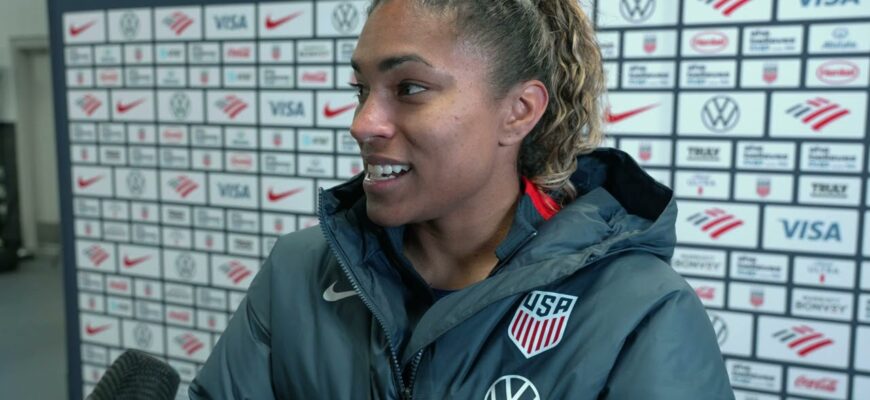Since taking charge after the 2023 World Cup, Emma Hayes has been implementing a period of experimentation for the U.S. women`s national team. She`s expanded the player pool ahead of the next World Cup, aiming to explore all options over the next two years. Unexpectedly, this phase has occurred without key forwards Trinity Rodman, Mallory Swanson, and Sophia Wilson – a trio affectionately dubbed the “triple espresso” – whose absence was unforeseen.
These three haven`t played for the team since the Paris Olympics in August. Rodman is currently recovering from a persistent back injury, while Swanson and Wilson are both on maternity leave. Their absence was always going to be significant; they have long been considered the next generation leading the USWNT`s attacking identity, living up to this reputation by scoring 10 of the team`s 13 goals at the Olympics.
However, their unavailability has allowed Hayes to integrate numerous new players into the U.S. attack, truly embracing the experimental spirit she promised after winning gold in Paris. Since the Olympics, she`s tested 11 different forwards not on the previous summer`s roster, with 10 being under 26 years old. In 11 games during this period, the USWNT has scored 22 goals and conceded only eight, indicating significant growth in attacking depth.
The team`s developing attack was evident in the recent 3-0 victory against China. Hayes` starting lineup of Alyssa Thompson, Catarina Macario, and Michelle Cooper proved effective, with all three contributing significantly to the goals. Macario was particularly impressive, registering a goal and an assist, while Cooper also provided an assist. Hayes credited the team`s overall hard work during this experimental phase for their fluid performance, noting the effortless feeling stemmed from their efforts.
Coach Hayes highlighted the reduced need for tactical adjustments as players like Avery Patterson, Lily Yohannes, and Michelle Cooper show improved understanding of their roles both offensively and defensively. This increased individual understanding allows the entire squad to operate at a higher level.
Within this newer attacking group, Macario and Thompson are among the more established players. Macario debuted in 2021 and has only missed time due to injury, while Thompson was part of the 2023 World Cup squad. Their strong club form, combined with national team performances, makes them key figures in Hayes` expansion efforts. Macario, known for her attacking midfield role for the national team, has recently excelled playing as a forward (#9).
Regarding Macario, Hayes commented on her self-critical nature, stating that while Macario aims for an even higher standard, she is a “wonderful football player” and a valuable asset to the team. Hayes added that they are “blessed to have her” and are “happy with her” performance.
Michelle Cooper is integrating well into the professional game in her third year. She now has one goal and one assist from five international appearances. Against China, she performed effectively in a wide position, demonstrating that she is beginning to establish herself within the USWNT`s attacking options, although there is still potential for further development.
Hayes described Cooper as a “firecracker,” highlighting her coachability and threat, particularly when running in behind defenses. While noting that Cooper`s touch wasn`t at its best against China, Hayes praised her goal-scoring ability, both in creating chances and finishing, and her growing comfort in the national team jersey. Hayes commended her personality, charisma, openness to feedback, and willingness to perform defensive duties, emphasizing that Cooper “will give everything for the shirt” defensively as well.
Other promising inexperienced forwards include Ally Sentnor and Emma Sears. Sentnor impressed at the SheBelieves Cup, scoring two goals in eight appearances, while Sears has one goal in five caps. Both have made strong early impressions and may feature in the upcoming friendly against Jamaica.
Hayes acknowledged that developing this young group is an ongoing process, which is expected given their limited international experience. However, she believes the U.S. team is making significant progress during this transition, fostering a renewed competitive environment that will likely make final roster selections challenging ahead of the next World Cup.
Discussing tactics, Hayes mentioned the desire for more dynamic player rotations to stretch the opponent`s defense, which worked well in the first half. She noted the team sometimes overplayed, looking for space between defenders instead of exploiting the space behind them, but added she wouldn`t criticize them for showing patience. Overall, she felt the team had reached a new tactical level, with players showing more control and ability, expressing satisfaction with the performance.







